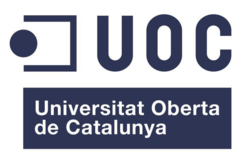Open University of Catalonia
| Universitat Oberta de Catalunya | |
|
UOC Headquarters in Barcelona | |
| Type | Public |
|---|---|
| Established | 1994 |
| Rector | Josep A. Planell i Estany[1] |
Academic staff | 3,346[2] |
Administrative staff | 477[2] |
| Students | 52,513[2] |
| Location |
Barcelona, Catalonia, Spain 41°24′53.29″N 2°8′0.8″E / 41.4148028°N 2.133556°E |
| Campus | Virtual |
| Affiliations |
Xarxa Vives d'Universitats Associació Catalana d'Universitats Públiques (ACUP) European University Association |
| Website | www.uoc.edu |
 | |
The Open University of Catalonia (Catalan: Universitat Oberta de Catalunya, UOC; IPA: [uniβərsiˈtat uˈβɛrtə ðə kətəˈɫuɲə]) is an Internet-centered open university[3] based in Barcelona, Spain.
The UOC offers graduate and postgraduate programs in Catalan, Spanish and English in fields such as Psychology, Computer Science, Sciences of Education, Information and Knowledge Society and Economics. Also, an Information and Knowledge Society Doctoral Program is available that explores research fields such as e-law, e-learning, network society, education, and online communities. It has "support centres and points" in a number of cities in Spain, Andorra, Mexico and the traditionally Catalan-speaking city of Alghero in Sardinia.[4]
Educational offer[5]
- Postgraduate courses
- Business Intelligence
- Societal and Business Conflicts
- Armed conflicts and crisis management
- Conflictology
- Crisis management
- Social and Family Conflicts
- Workplace and Commercial Conflicts
- Armed conflicts
- Food Security Programme Management
- Food Security Management and The Right to Food
- Food, culture and locality
- Food, society and international food governance
- Food, culture and territory
- International agri-food policy
- Geographic indications
- Food systems analysis
- Food Security: Assessment and Action
- Impact Assessment on Food Security Programs
- Right to food
- Food and Society
- E-Learning Design and Development. UOC-UNM (University of New Mexico, USA) – Joint Certificate
- E-learning course design and teaching – European certificate
Faculties

The UOC's course offering is divided into these Faculties:[6]
- Faculty of Arts and Humanities
- Faculty of Economics and Business
- Faculty of Health Sciences
- Faculty of Information and Communication Sciences
- Faculty of Computer Science, Multimedia and Telecommunications
- Faculty of Law and Political Science
- Faculty of Psychology and Education Sciences
Graduates
- 2000 – 118
- 2001 – 142
- 2002 – 431
- 2003 – 954
- 2004 – 2,185
- 2005 – 2,956
- 2006 – 3,248
- 2007 – 4,242
- 2008 – 5,890
- 2009 – 6,138
- 2010 – 5,926
- 2011 – 6,547
- 2012 - 7,905
- 2013 - 6,450[2]
Institutional repository
The UOC makes O2, their institutional repository, available to provide open access to digital publications produced by the UOC community in the course of its research, teaching and management activities.
References
- ↑ Ivanna Vallespín. "El patronato de la Universitat Oberta nombra Josep Anton Planell nuevo rector". El País (in Spanish). Retrieved 30 July 2013.
- 1 2 3 4 "UOC in numbers 2011–12". Universitat Oberta de Catalunya. Retrieved 30 July 2013.
- ↑ "FAQs. About the UOC". Universitat Oberta de Catalunya. Retrieved 30 July 2013.
- ↑ "Where we are. Contact and offices". Universitat Oberta de Catalunya. Retrieved 30 July 2013.
- ↑ "All UOC courses". Universitat Oberta de Catalunya. Retrieved 30 July 2013.
- ↑ "Departments and schools". Universitat Oberta de Catalunya. Retrieved 30 July 2013.
External links
Coordinates: 41°24′53.29″N 2°8′0.8″E / 41.4148028°N 2.133556°E
| ||||||||||
